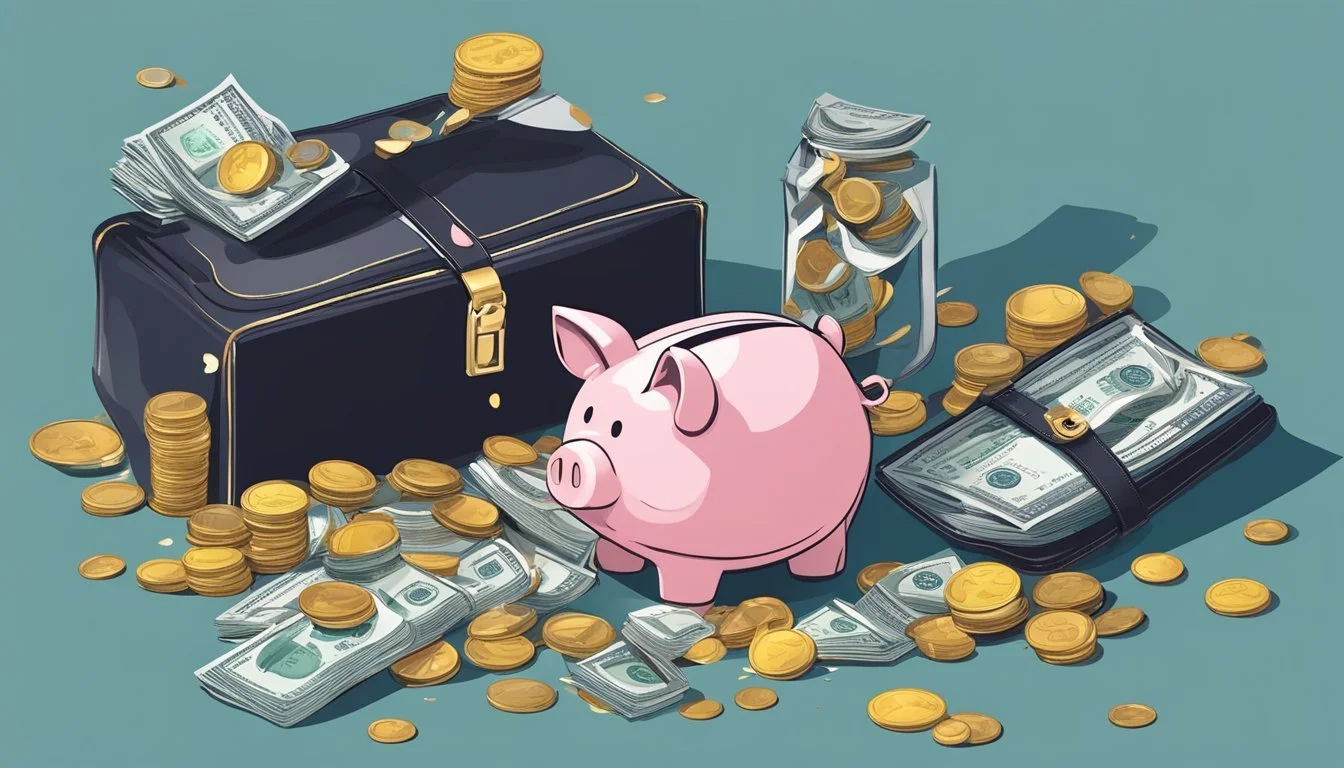5 Reasons Why Narcissists Often Struggle with Financial Instability
Key Insights
Understanding the relationship between narcissism and financial stability illuminates why narcissists often face financial struggles. The traits that define narcissistic behavior—such as a need for control, excessive self-importance, and impulsive actions—can significantly impact their financial decisions and stability.
Narcissists prioritize maintaining a certain image and social status, which often leads to financially irresponsible behaviors. The drive to impress others and uphold an extravagant lifestyle can result in excessive spending and poor financial planning. This article will explore the underlying factors contributing to the financial instability commonly observed in narcissistic individuals.
1) Overspending on Luxury Items
Narcissists frequently use money as a tool to construct an image of wealth and success. They often buy extravagant gifts, luxury vacations, and the latest sports cars. These purchases are not necessarily for personal enjoyment but to impress others and reinforce their desired self-image.
The desire to be perceived as affluent can lead narcissists to spend well beyond their means. This behavior often results in significant financial strain. Luxury items become essential to maintaining their facade, even if it compromises their financial stability.
Narcissists may ignore their financial responsibilities in favor of maintaining this image. They prioritize material wealth over saving or investing wisely. This disregard for prudent financial planning further jeopardizes their fiscal health.
Their financial decisions are largely driven by the need for external validation. Narcissists seek admiration and approval from others through their material possessions. This cycle of overspending to impress can lead to mounting debt and financial instability.
Overspending on luxury items is a common trait among narcissists. It is driven by their need to appear successful and wealthy, despite the potential for severe financial consequences. This pattern highlights the complex relationship between narcissism and financial behavior.
2) Overuse of Credit Cards
Narcissists often exhibit reckless spending habits, particularly with credit cards. They may frequently max out their limits, relying on credit to fund their lifestyle.
Such behavior stems from a desire to project an image of wealth and success. This need for validation leads them to make extravagant purchases they cannot afford.
Narcissists sometimes place all credit accounts in their partner’s name. By doing so, they avoid responsibility, leaving others to handle the debt.
Additionally, lying about finances is common among financially abusive narcissists. They might exaggerate their income or hide debts to maintain control over their partners.
Regularly overusing credit cards can lead to severe financial instability. Without intervention, the debt can spiral out of control, impacting both their own and their partner's financial security.
To learn more about the deceptive spending habits of narcissists, visit this article on narcissist financial abuse. The risks are compounded by a narcissist's tendency to assign liability for debts to their partners, as detailed in Psych Central's article.
3) Poor Money Management Skills
Narcissists often display an outward appearance of success and grandiosity. However, their financial habits frequently reveal a stark contrast. Many narcissists exhibit a pattern of poor money management skills that can lead to financial instability.
A common trait among narcissists is their tendency to prioritize immediate gratification. They may frequently make impulsive purchases without considering long-term financial consequences. This behavior can result in accumulating debt and financial chaos.
Narcissists may also lack a realistic understanding of budgeting. They can often ignore or dismiss the importance of maintaining a balanced budget. This disregard for financial planning can make it difficult for them to manage their resources effectively.
Financial manipulation is another tactic used by narcissists. They might use money as a tool to control or dominate others. This can lead to financial strain and conflict in personal relationships.
Narcissists often avoid accountability for their financial mistakes. They may blame others for their financial problems rather than taking responsibility. This avoidance prevents them from learning and improving their money management skills.
For more insights on the financial behaviors of narcissists, see how they exhibit toxic money habits as highlighted by experts.
4) Impulse Purchases
Narcissists often exhibit impulsive behavior. This impulsivity extends to their financial decisions, leading to frequent and uncontrolled spending sprees. They might buy items they don't need simply because it provides an immediate sense of satisfaction or status enhancement.
Impulse purchases can arise from a narcissist's need for instant gratification. The quick thrill of buying something new can temporarily boost their self-esteem. An extravagant purchase can also serve as a way for them to impress others.
Furthermore, narcissists may rationalize these purchases by believing they deserve the best. This belief can cause them to spend beyond their means, accumulating debt. Such actions contribute to their ongoing financial instability.
In addition to seeking validation, narcissists might have difficulty resisting sales or promotions. They might convince themselves that these deals are too good to pass up, even if the purchase is unnecessary. This behavior exacerbates financial strain.
Lastly, narcissists often lack the foresight to plan long-term. Their focus on immediate rewards can prevent them from considering the future financial consequences of their actions. This lack of planning further aggravates their financial instability.
5) Debt Accumulation
Narcissists often struggle with debt accumulation due to several underlying behavioral patterns. A major factor is their tendency to live beyond their means in order to project an image of success and affluence.
They use credit impulsively to finance luxury items, vacations, and social activities. These actions are often motivated by a deep-seated need for admiration and validation from others.
Manipulative financial practices further compound this issue. Narcissists may use money as a tool for control, which can lead to irresponsible financial decisions and significant debt.
Another contributing factor is the lack of long-term financial planning. They tend to focus on short-term gratification rather than sustainable financial stability.
This combination of impulsivity, need for control, and lack of foresight creates a financial environment ripe for debt accumulation. It often results in financial instability and mounting unpaid bills.
Understanding Narcissism
Narcissism involves patterns of self-centered behavior, a need for admiration, and a lack of empathy. These traits collectively fuel various interpersonal and financial struggles.
Defining Narcissistic Personality Disorder
Narcissistic Personality Disorder (NPD) is a mental health condition characterized by an inflated sense of self-importance and a deep need for excessive attention and admiration. People with NPD often believe they are superior to others and have little regard for other people's feelings.
They may be preoccupied with fantasies of unlimited success, power, brilliance, beauty, or ideal love. These individuals often struggle with relationship issues because they possess an unrealistic sense of entitlement.
NPD typically emerges in early adulthood and can affect personal and professional relationships significantly. Diagnosis is based on specific behavioral patterns and is made by mental health professionals.
Characteristics of Narcissists
Narcissists showcase a range of traits that significantly impact their interactions and decision-making processes. They often exhibit grandiosity, a persistent need for admiration, and a sense of entitlement. They might exploit others for personal gain and lack empathy, making genuine connections difficult.
Manipulative behaviors, arrogance, and sensitivity to criticism are common. They tend to dominate conversations, belittle or look down on those they perceive as inferior, and insist on having the best of everything. These characteristics extend to various aspects of their life, including financial decisions and relationships. Their self-interested actions can lead to a cycle of instability and conflict.
Narcissism and Financial Instability
Narcissists often face financial instability due to their impulsive spending habits and a tendency to make risky financial decisions. These behaviors stem from deeper psychological needs and insecurities, which frequently translate into financial mismanagement.
Impatience and Impulsive Spending
Narcissists typically demonstrate impatience and impulsiveness, particularly in their financial habits. They place high value on immediate gratification, often buying expensive items to maintain a certain image or status. This need for instant fulfillment leads to frequent overspending.
The financial strain this causes is significant. Monthly budgets can be quickly exhausted, leading to accumulated debt. Credit cards become a common tool for managing financial shortfalls, exacerbating the problem with high-interest rates. This cycle of spending and debt does not only affect personal finances but also impacts relationships with family and friends who may be asked for financial assistance or burdened by the narcissist’s financial irresponsibility.
Risky Financial Decisions
Narcissists are prone to making impulsive and risky financial decisions. Their craving for admiration and fear of inadequacy drive them to invest in ventures without thorough research or planning. Whether it's gambling, speculative investments, or dubious financial schemes, these choices are often poorly thought out.
Such risky behaviors are exacerbated by overconfidence and a sense of invincibility. Narcissists believe that their decisions will yield positive results, ignoring potential negative outcomes. As a result, they frequently encounter significant financial losses. This financial volatility undermines their long-term economic stability and can lead to serious consequences, including bankruptcy or legal issues.
By understanding these specific patterns, it's clear why financial instability is a common issue for individuals with narcissistic traits. The combination of impulsive spending and risky decisions creates a challenging financial landscape for narcissists.
Long-Term Implications of Financial Instability
Financial instability in narcissists can lead to detrimental effects on their relationships and professional life. These individuals often face significant challenges that further compound their struggles.
Impact on Relationships
Narcissists' financial instability can create continuous stress in their relationships, particularly with partners and family members. The need for control often manifests through financial manipulation, where they may restrict access to money or create debts without consultation.
This behavior can lead to mistrust and conflict, eroding the foundations of the relationship. Over time, financial arguments become a common occurrence, further destabilizing the environment at home. In some cases, partners or family members may feel the need to seek financial independence or leave the relationship entirely.
Children in these households also suffer as they might experience direct financial strain or witness continuous conflict over money. This situation undermines the family’s emotional well-being, creating a cycle of instability that can persist across generations.
Professional Repercussions
Financial instability impacts narcissists' professional lives as well. Their reputation can suffer due to irresponsible financial behaviors, such as failing to manage personal or business finances prudently. This irresponsibility often translates into missed payments, poor investment choices, or even legal issues due to financial misconduct.
In the workplace, colleagues and superiors may lose trust in a narcissist's ability to handle responsibilities effectively. This loss of trust can lead to fewer opportunities for career advancement or, in extreme cases, job loss. Narcissists may also struggle with maintaining professional relationships, as their need for control and admiration often clashes with effective teamwork and cooperation.
Moreover, the constant stress of financial instability can diminish their work performance, leading to a decline in productivity and overall job satisfaction. This creates a detrimental cycle where their professional and financial lives continuously affect each other negatively.





